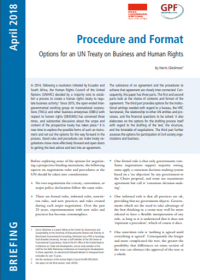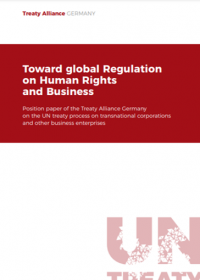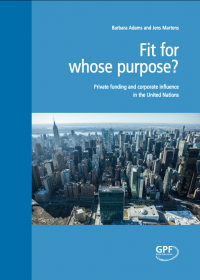
By Harris Gleckman
Published by: Global Policy Forum and Rosa Luxemburg Stiftung-New York Office
Berlin/Bonn/New York, April 2018

By Harris Gleckman
Published by: Global Policy Forum and Rosa Luxemburg Stiftung-New York Office
Berlin/Bonn/New York, April 2018
The United Nations face a funding dilemma. On the one hand, member states continue to transfer new responsibilities to the UN system, not least in implementing the 2030 Agenda and their Sustainable Development Goals (SDGs); on the other hand, they do not match these mandates with adequate resources.
Some see the way out of this financial mess in reinforced UN partnerships with private donors and their foundations. The UN Foundation (UNF) plays a special role here. It was established by [...]
CIVICUS speaks with Barbara Adams, senior policy analyst at the Global Policy Forum (GPF), an independent policy watchdog that monitors the work of the United Nations and scrutinises global policy-making. Founded in 1993 by a group of progressive scholars and activists, GPF promotes accountability and citizen participation in decisions on peace and security, social justice and international law. It does so by gathering information and circulating it through a comprehensive website, playing an active role in civil society networks and [...]

Published by: Attac Deutschland, Brot für die Welt, Bund für Umwelt- und Naturschutz Deutschland, Christliche Initiative Romero, CorA-Netzwerk für Unternehmensverantwortung, Femnet, FIAN Deutschland, Forschungs- und Dokumentationszentrum Chile-Lateinamerika, Forum Fairer Handel, Forum Umwelt und Entwicklung, Global Policy Forum, INKOTA-netzwerk, medico international, MISEREOR, PowerShift, SÜDWIND and WEED
Berlin, December 2017
Jointly organized by: Brot für die Welt, FIAN International, Friends of the Earth Europe, Global Policy Forum, Rosa Luxemburg Stiftung-New York Office
In June 2014, the Human Rights Council established the open-ended inter-governmental working group (OEIGWG) to elaborate an international legally binding instrument on transnational corporations and other business enterprises with respect to human rights. After two sessions in 2015 and 2016 and substantive discussions on the scope and content, it is time to begin negotiations among those parties interested [...]
Join the Reflection Group on the 2030 Agenda for Sustainable Development, UNRISD and FES for the Geneva launch of the Spotlight on Sustainable Development 2017 report. Carrying the subtitle "Reclaiming policies for the public. Privatization, partnerships, corporate capture and their impact on sustainability and inequality - assessments and alternatives", the civil society "shadow" report provides a wide-ranging independent assessment of the implementation of the 2030 Agenda and its Sustainable Development Goals. At the event, contributors will present and discuss key [...]
A global coalition of civil society organizations and trade unions present the Spotlight on Sustainable Development 2017 report. The report provides a comprehensive independent assessment of the implementation of the 2030 Agenda and its Sustainable Development Goals (SDGs).
The 2017 edition focuses on privatization, partnerships, corporate capture and the impact they have on sustainability and inequality. The articles and textboxes cover all sectors of the 2030 Agenda and the SDGs. According to the report, it is time to counter privatization [...]
Transnational corporations and their national and international associations and lobby groups are using the G20 process as important opportunity to engage with the world’s most powerful governments, shape their discourse, and influence their decisions.
Corporations and their interest groups have become powerful actors in international policy debates on sustainable development and human rights as well. They are positioning themselves as more flexible, efficient and un-bureaucratic than states and are promoting “multi-stakeholder initiatives” and “public-private partnerships” as innovative models to tackle [...]
In cooperation with Rosa Luxemburg Stiftung—New York Office, Public Services International (PSI), Development Alternatives with Women for a New Era (DAWN), and Rutgers’ Center for Women’s Global Leadership.
International leaders and civil society activists will soon convene again at the UN Headquarters in New York for the Commission on the Status of Women (CSW61), which will take place from March 13 to 24, 2017. This year, the Commission will address the issue of women’s economic empowerment in the changing [...]
In an unprecedented and historic move, the Sixth Committee of the UN General Assembly recently granted observer status to the International Chamber of Commerce (ICC). The resolution was submitted by France, Albania, Colombia, the Netherlands and Tunisia and was adopted during the seventy-first session of the General Assembly. The resolution sets out the ICC’s position as observer in the General Assembly from 1 January 2017 on.
For the first time, the [...]
The international debate surrounding the environmental, social and human rights responsibilities of corporations has been gaining momentum. Growing public criticism of transnational corporations and banks has contributed to this debate. The list of criticisms is long: pollution scandals, disregard for basic labour and human rights standards, massive bribery allegations, on top of widespread corporate tax avoidance.
At the same time, corporations and their interest groups have become powerful actors in international policy debates on poverty eradication, development, the environment and [...]
It may sound like an issue for health specialists, but at the UN high-level meeting on antimicrobial resistance (AMR) ministers and heads of state from around the world made clear that it is more than that it appears.
This is the fourth time that the UN General Assembly has addressed health issues. As the representative of Portugal pointed out, this meeting “is proof of global recognition of this problem and how important an issue [...]
During the session on “accountability and transparency of multi-stakeholder partnerships” held in the framework of the Partnership Forum at the UN, Barbara Adams from Global Policy Forum and Social Watch said that partnerships are based in a win-win dynamic but there is a need to understand of what is “win-win”.
Would be beneficiaries of such initiatives have to be included, she argued. “We need to look and see how the contribution of partnerships has benefits. We need a more systemic [...]

"Follow the money” is the recipe for good investigative journalism and Fit for Whose Purpose does precisely that for the institution created to defend global public goods. Digging into the numbers behind the funding of the United Nations, Adams and Martens uncover a trail that leads to corporate interests having a disproportionate say over the bodies that write global rules. This book shows how Big Tobacco, Big Soda, Big Pharma and Big Alcohol end up prevailing and how corporate philanthropy [...]
The outcome document for the Third International Conference on Financing for Development (FfD3) is being finalized at the United Nations in New York. This is a key moment to make an assessment and influence the issues under negotiation to ensure progress is not lost in the interests of fact-tracking consensus. The outcome document must establish new ground on a range of issues such as combatting illicit financial flows and global tax cooperation.
Key to this is action on proposals of [...]
Civil society has put forward and worked hard to defend a vision of a new Post-2015 Agenda that will approach human rights, environmental integrity and the urgency of dealing with climate change in a way that addresses the injustice and inequity inherent in gender, social, political and economic relations at all levels.
As we approach the final phase of agreeing on the framework, there are clear indications that we are further from reaching this vision in the post-2015 agreement than [...]
Civil society organizations and social movements around the world struggling against corporate abuse achieved a first victory in June last year when the UN Human Rights Council adopted Resolution 26/9, establishing an Intergovernmental Working Group whose the mandate shall be to elaborate an international legally-binding instrument to regulate the activities of business enterprises. However, there remain important challenges to ensure that a robust treaty ensuring genuine corporate accountability and access to justice will be drafted in a participatory and transparent [...]